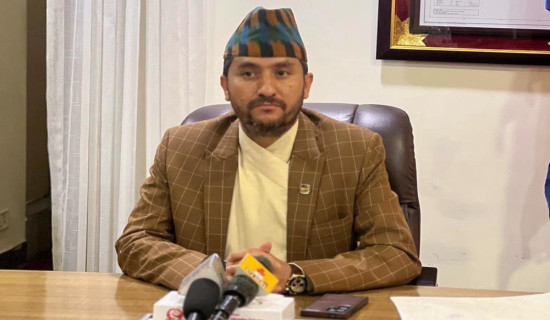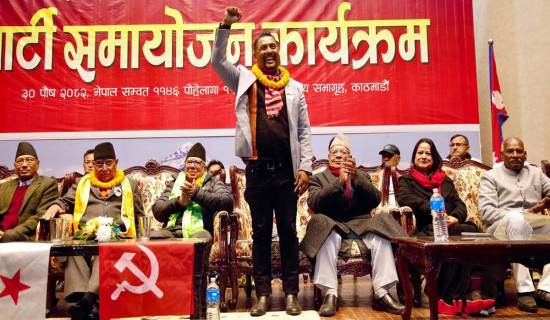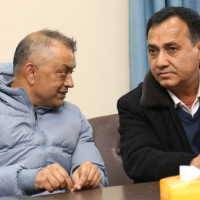- Thursday, 15 January 2026
Paradigm Shift In International Relations
International relations continue to revolve around the spectrum of cooperation, competition and conflict based on the national interests of nation-states. What has changed is the reordering of relations among nations, the shifting of their priorities and the growth of new poles of power. This changing constellation of nation-states has made old institutions of governance, such as the UN and WTO, relatively weak while new regimes such as BRICS are surging with vitality.
For small states, the choices do not seem favourable as power relations are governed by crude realism rather than normative consideration of international laws, values and institutions. The rise of President Donald J. Trump in the United States and his transactional policy initiatives has unsettled its ties with its allies, rivals and foes alike. The intricate geopolitics has made the global order, stability and peace contested, where big powers face the Hobbesian dilemma, unfolding several mixed games.
Incompatibility of regime and national interests: Unlike Joe Biden’s policy to bi-polarise the world into democratic and non-democratic nations, President Trump focused more on the sovereignty of nations than the idealpolitik of democratic affinity. In his speech at the UN, he said, “honour the right of every nation to pursue its own customs, beliefs and traditions.” His MAGA approach has imposed tariffs on all nations of the world irrespective of regime but his eye on resources is luring to Greenland, Ukraine and Venezuela.
US unilateralism
Great powers have not abandoned their aspirations for extra-territorial claims. Unilateralism of the USA has alienated the EU, India, African, Asian and Latin American states. His imperial tone to integrate Canada and Greenland and the border control of Mexico alienated neighbours. The American MAGA vision seems disproportionate to its capacity, acceptability, and responsibility. Nations of the Global South, irrespective of regime incompatibility, are gravitating to China, India and Russia. A number of European states and Japan, frustrated over President Trump’s tariffs, are lured to BRICS and its policy of de-dollarisation. Even Japan and Canada, allies of the US, are considering joining this move.
Pivoting of nations to new power centers: The EU has set its three priorities: rebalancing economic relations with China, de-risking economic relations with the US and other friendly nations and advancing diplomacy on global issues, including climate change. Ukraine’s European allies are struggling to set up a force to back up any peace agreement with Russia and a coalition of 30 nations of Europe, Japan and Australia has agreed to support this initiative. In the NATO defense chiefs meeting for Ukraine’s security guarantee, they have outlined an offensive plan to push back Russia as a security guarantee for Ukraine and Europe.
The approach of NATO differs from the US, as the former wants the return of all Ukrainian territory lost to Russia, while the latter views that it would be difficult, as Russia is strong and the continuation of the war with it may have cataclysmic effects. The Russian determination to keep its hold may alter the balance of power and escalate nuclear confrontation. It responded that without its participation, the security arrangement would not work and affirmed that it believes in diplomacy and peace but can use its strength where and when necessary.
President Trump is calling another meeting with Russia. He even threatened President Putin that if the peace accord does not reach, Russia would face “severe consequences “including extra sanctions and has reinforced its army deployment in Poland along with European nations to deter Russia from advancing, while NATO is consolidating its military base in Romania. The US knows Iran, North Korea and China would not like to see the defeat of Russia in Ukraine. The US and Russia are, however, discussing cooperation on Liquefied Natural Gas (LNG) in the Arctic and relaxation of crippling economic sanctions against the latter. Russia fears the US entering into a unified front with Europe against it.
The US is seeking to strengthen its Asian allies — Japan, South Korea, Taiwan, the Philippines and Australia and suggesting to them to equip with new weapons, augment cooperation among themselves, increase defense expenditure and deter China but also bargaining with China’s rare Earth materials for tariff cuts. It provides nuclear shields to its Asian allies and consolidates its military bases on Okinawa, Guam and Hawaii against China’s growing presence in the South China Sea. South Korea and Japan have entered into cooperation on AI and energy but it is doubtful whether they risk confrontation with China, given the American credibility deficit. It is also hard to say whether India, a member of QUAD, will be willing to toe the American foreign policy line when its relations with China have improved, while with the USA, it remains frigid over the purchase of Russian oil and weapons.
Surge of third nuclear age: The third nuclear age is defined as a great power contest, miscalculation of each other’s intentions and maneuvers, deterrence deficits, no halt to nuclear proliferation, use of AI and other technologies in warfare and complex geopolitical entanglements in conflict with the risk of escalation of nuclear war. The Strategic Arms Reduction Treaty (START), a bilateral treaty between the US and Russia, is on its deathbed. On February 20, 2023, Russian President Putin declared the halt of Russia’s participation in the New START treaty and barred the US and NATO from examining its nuclear facilities.
The UN is under pressure from many nations to adopt a treaty to ban nuclear development, acquisition, stockpiling and use of nuclear weapons. Iran, which has suspended nuclear talks with the UN following the IAEA’s failure to slam US strikes on its nuclear facilities, is resuming talks with European nations and meeting in Geneva. A total of 190 nations have signed the Nuclear Non-Proliferation Treaty.
Entangled geopolitics: International relations have become a mixed game, not entirely zero-sum. Canada, France, the UK and Australia are considering recognising the state of Palestine, while Germany has refused to supply arms to Israel, a lynchpin of American foreign policy in the Middle East. The human rights situation in Gaza is deteriorating and the UN has called on nations to alleviate the avoidable situation. Russia and China are feeding Iran to prevent an Israeli attack. The meeting of European leaders and Ukrainian President Volodymyr Zelenskyy with President Trump in the White House is deemed productive. But the US showed no readiness to provide a security guarantee to Ukraine.
Instead, the US President warned that neither Europe nor Ukraine can defeat Russia and suggested that it would be better to protect Ukraine by ceding 20 per cent of territory to Russia than continue with war and lose the entire nation. Zelenskyy, however, asserted that he would not cede any territory for peace, adding that he is not only fighting for himself but for the defense of entire Europe. European leaders and Ukraine objected to the land swap but agreed to a trilateral meeting with President Putin on peace and collective security. Russia seems ready for peace with Ukraine and to meet Zelenskyy if the agenda is ready for it.
The EU is trapped between China’s withdrawal of its key tech exports to Europe and Trump’s tariffs. European leaders, however, warned the US not to give Russia a guarantee about Ukrainian NATO and EU membership and land swap. President Trump cannot put pressure on either Russia or Europe and even Ukraine for a ceasefire, so he accepted Russian conditions for a final peace agreement, neutrality of Ukraine and land swap and left the Ukraine issue to Europe to handle and organise dialogue of the US, Europe, Russia and Ukraine.
Russia has objected to multilateral meetings because Europe is supplying arms to Ukraine, allowing it to choose NATO and EU membership and claiming territorial integrity. This prompted the USA to shift its attention to regime change in Venezuela under the guise of dismantling drug cartels. Mexico expressed its readiness to cooperate on controlling drug cartels, but it loathes the invasion of Venezuela. America does not want the strategically important and oil-rich Venezuela to slip to China, which imports 90 per cent of its crude oil and Russia, with whom it has recently signed a strategic alliance and thus both are committed to defending its sovereignty. China has criticised the US gunboat diplomacy and its pursuit of regime change against the code of international law.
The rise of new multilateralism: The UN, which until recently claimed universal moral authority and legitimacy for global governance, is weakened by the retreat of the US and great powers defying its principles. Even the International Criminal Court, set up to listen to crimes against humanity, is losing its lustre. Many allies of the US, such as Japan, Mexico, Canada and Spain, are joining BRICS, its a tendency to move to de-dollarisation and reduce American financial dominance of the world. China has offered the whole African continent a tariff facility and increased investments for its development based on its cultural model.
New multi-lateral regimes are being created through cooperation and connectivity networks such as Russia-India-China (RIC), China-ASEAN-Gulf Cooperation Council, China-Pakistan-Afghanistan, Eurasian Economic Union, etc., while Russia is connecting them with Iran and Central Asian states through a rail network. The Belt and Road Initiative (BRI) is connecting continents and nations and orienting them to new growth poles of Asia. Small nations' desire for multilateralism and world community, considering that moral values and institutions can act as deterrence against interference in their sovereignty, territorial integrity and extra-territorial claims by great powers.
The SCO security frame is deemed as the Global South’s solidarity. Europe is consolidating its economy, technology and defense to exercise strategic autonomy and strengthen its own currency. The 55-nation African Union is struggling to project its historical pride and greatness. BRICS is making a massive power shift as 32 nations stand in line to join it, aiming to strengthen their strategic partnership, trade, finance, consumer market, oil and energy supply away from the US. Americans are anxious about the increasing loss of the dominance of the dollar.
Balance of power
Many nations have agreed to conduct trade in their own currencies. India’s economic growth, independence and assertiveness against the US are shifting the balance of power in world politics. The RIC bloc refuses to play by the American rule and increases its leverage in world politics. This bloc might frustrate the Indo-Pacific Strategy; weaken QUAD and any US effort to push back against China. Speculation is rife that the US might indulge in a regime change strategy in India. Nepal, caught in the cross-pressure of geopolitics, is seeking to keep its territorial integrity and prefers to settle India and China by opening trade routes through its territory -- Liepulek, Limpiyadhura and Kalapani without its consent through negotiation.
It is now suffocated by a sort of bi-gemony and keen to engage in diplomatic overture. If the new world order to come will be hegemonic, how can small nations like Nepal evade their extra-territorial claims and sphere of influence and exercise freedom of maneuver? How can small nations benefit from cooperation with the great powers based on sovereign equality and reciprocity? Will the new paradigm of international relations be based on the social contract or the hegemony of the powerful over the powerless? A separate inquiry is needed to address these questions.
(Former Reader at the Department of Political Science, TU, Dahal writes on political and social issues.)
















